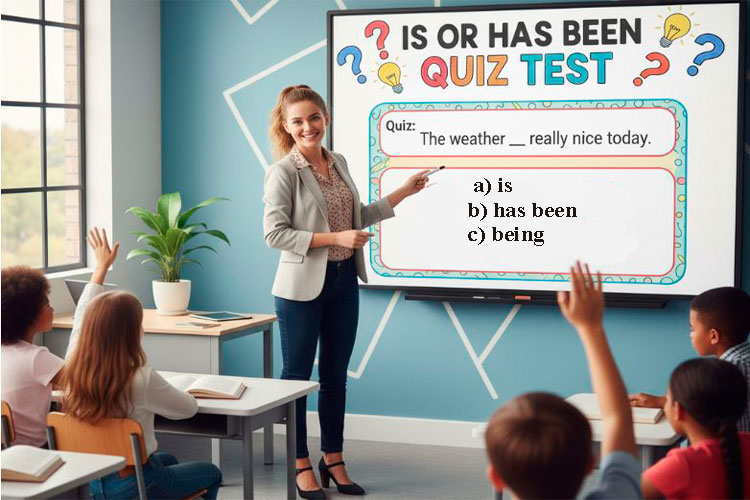If you’ve ever been confused about when to use “is” and when to use “has been,” you’re definitely not alone. These two forms of the verb “to be” are often confused because they both describe states or actions related to time, but in different ways.
The word “is” is used in the present simple tense, referring to something that’s happening right now or is currently true.
Example: She is happy.
On the other hand, “has been” is part of the present perfect or present perfect continuous tense, showing that something started in the past and continues into the present.
Example: She has been happy since morning.
If you want to strengthen your grammar and learn when to use each correctly, this Is or Has Been Quiz is a fun and effective way to practice!
Is or Has Been Quiz
Don’t miss to take another related quiz test: Will Be or Would Be Quiz
Examples and Exercise quiz of the Is or Has Been
She ___ waiting for the bus for over an hour.
a) is
b) has been
c) was
2. The weather ___ really nice today.
a) is
b) has been
c) being
3. He ___ very busy lately with work.
a) is
b) has been
c) were
4. This city ___ one of the most beautiful places in Europe.
a) is
b) has been
c) be
5. It ___ raining all day long.
a) is
b) has been
c) was
6. She ___ excited about her new job.
a) has been
b) is
c) were
7. My brother ___ studying French since last year.
a) is
b) was
c) has been
8. This phone ___ very popular among young people.
a) is
b) has been
c) are
9. He ___ working hard to improve his fitness.
a) has been
b) is
c) will be
10. There ___ a lot of improvement in your writing.
a) is
b) has been
c) were
Answers to the Quiz
- b) has been
- a) is
- b) has been
- a) is
- b) has been
- b) is
- c) has been
- a) is
- a) has been
- b) has been
Grammar Tip: Is vs Has Been
Use “is” for something happening right now or a current fact.
Example: He is tired.
Use “has been” for something that started in the past and continues now or has recently happened.
Example: He has been tired since morning.
Understanding the time frame helps you choose the correct form every time!
FAQs About “Is or Has Been”
What is the main difference between “is” and “has been”?
“Is” describes a current state, while “has been” connects past actions or conditions to the present moment.
Can we say “is been”?
No. The phrase “is been” is grammatically incorrect. Always use “has been” for perfect tenses.
When should I use “has been”?
Use “has been” when something began in the past and continues to the present, especially with a duration or continuous action.
Example: She has been working all morning.
Is “has been” always followed by an -ing verb?
Usually yes, as in has been + verb-ing. But it can also be used before adjectives or nouns.
Example: She has been tired.
Why is this quiz useful for English learners?
Because it helps you practice real-life English grammar situations and avoid common mistakes when using is and has been.
Conclusion
Learning the difference between “is” and “has been” is essential for mastering English grammar. Both forms describe states or actions but refer to different time frames — the present moment versus the ongoing result of a past action.
By practicing with this Is or Has Been Quiz, you’ll gain the confidence to use these forms naturally in speech and writing. Keep practicing daily, and soon you’ll never mix them up again!

